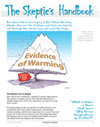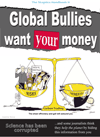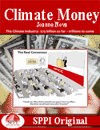|
|
It doesn’t have to be this way. The most important price in our economy is set by a bunch of bureaucrats. They are unelected and unaccountable. But your day to day life is affected by their decisions, as well as your ability to buy a house or for your retirement savings to maintain their value. Some people are wiped out by a mere phrase in a memo. There is a deep Soviet style management program at the centre of all Western economies. It’s time we talked about that ogre.
Maurice Newman, former chair of the Australian Stock Exchange (ASX), writes in The Australian about the defining invisible issue which is rarely discussed — our currencies, our central banks:
Vladimir Lenin advocated: “The best way to destroy the capitalist system is to debauch the currency.” True or not, we seem hellbent on finding out.
Dark times are coming:
The BIS has rung the alarms. We are warned that the world’s most reckless monetary experiment, which has taken interest rates to the lowest in recorded history, is failing. Central bankers remain silent, not knowing how or when to end what they began, while the political class simply looks […]
The tide of money, the vested interests flows
H/t to Eric Worrall at WattsUp.
The current “green” industry is already around $1.5 Trillion a year. Mark Carney, the Governor of the Bank of England said he expects this to grow to $5-7 trillion.
Financial Post: Climate change a $7 trillion funding opportunity
He said that given the enormous funding needs for clean infrastructure — he estimates at somewhere between $5 trillion and $7 trillion a year — investment opportunities will rebound.
If clean green energy was efficient, cheap and reliable there would be no “funding need” as the market would leap to exploit that opportunity. Instead most leading investors act like they are skeptics. The fact that central bankers are selling it so aggressively says a lot. Perhaps central bankers want to help the poor and save the world, or could it be that the entire financial industry will profit from a fake, forced market and another fiat currency? What are the brokerage fees on a $7T market…
Again we get this “free market” myth:
[Carbon pricing is the cleanest way for markets to judge the tangible exposure to climate change,” said Carney
[…]
Something suddenly changed in December last year in the world’s second largest economy (some say it’s the first). For the last few years private investors in China have been running away at a faster and faster pace. Apparently, no one wants to invest in the Chinese economy except the government, and six months ago, the State launched a rocket.
The massive growth of China is partly thanks to rampant money-printing. Say hello to Malinvestment. The Chinese economy is sick. It’s distraction time. Anyone want to stoke a war?
…
I saw the graph on the ABC news last night thanks to Phillip Lasker. The original graph came from Bloomberg under this unlikely headline:
China Proves Doubters Wrong For Now as Credit Boom Stokes Growth
“Stoking Growth” is not always desirable — to go biological — cancer “stokes growth” and so does Ebola.
“The amount of cash Beijing is shoveling into the economy is stunning,” said Andrew Collier, an independent analyst in Hong Kong and former president of Bank of China International USA. “Given high fixed-asset investment among state-owned enterprises, it’s likely most of it is being consumed by the inefficient state sector. This […]
For five days headlines have told us the markets are being “Pounded”, with “Turmoil”, like a “Wild Ride” with “bloodletting“. I thought I’d graph the horror of the last week on the FTSE100, DAX, the CAC40 and the Euronext. Naturally big-government fans in the media have no interest in overselling the disaster that is Brexit.
Spot the crisis?
The last five years of the FTSE 100. See the carnage of the last week:
5 Year FTSE graph TradingEconomics.com
More shocking routs on the continent. Here’s the last twelve months of the EURONEXT:
9.4 out of 10 based on 56 ratings […]
Both sides of Brexit were shocked — the Remainers because they have never met a Brexiteer nor bothered to read their arguments. And The Brexiters were a bit shocked too — amazed that despite the big-media bias, puffed up economic scare and the blanket of institutional warnings, the public can still fight off big-gov with their votes in a bloodless coup. It’s a rare win.
Who wants to be tied to an economic basketcase?
Under the media shock and warnings of the recession coming almost no one mentioned “Switzerland”, or “Norway“. Here’s the GDP growth graph from the World Bank showing just how well the EU fares compared to the non-EU countries of Australia, New Zealand, Canada, The US, Switzerland and Norway. Note the success of the EU red line which in nearly every year is outdone by nearly everyone else. The economic disaster that the UK faces is better GDP growth.
EU GDP Growth 2008 – 2015, World Bank, compared to non-EU nations, Switzerland, NZ, US
The reasons to leave the EU were so compelling the amazing thing is that 48% of the public still voted to stay. Chalk that “success” up to the media, and on an […]
Best wishes to our UK friends on this important day. UPDATE: Polls shut at 10pm on Thursday UK time (7am Friday AEST). Final Tally: “breakfast time” Friday in the UK ( which is 4- 6pm on the East Coast of Australia).
“… it’s the last chance most of us are ever going to get in our lifetime to vote for an outcome which is genuinely in the interest of us the people – the demos – rather than that of the increasingly powerful, ever-more-deeply-entrenched elite.”
— James Delingpole
The British Isles Invented Freedom
“… the people of what is now called Great Britain created something entirely different from the closed and centralized regimes that have been the norm in most of human history. They produced a society where rulers were subject to the law and the law belonged to the people, where collective will did not trump individual right, and where free citizens were permitted to create and keep their own wealth. These principles have transformed the world: “The miracles of the past three and a half centuries—the unprecedented improvements in democracy, in longevity, in freedom, in literacy, in calorie intake, in infant survival […]
Children Win Another Climate Change Legal Case In Mass Supreme Court
[Forbes] This case is one of several similar cases in federal district courts in Oregon and Washington, and in the state courts of North Carolina, New Mexico, Pennsylvania and Colorado. All of these legal cases are supported by Our Children’s Trust, that seeks the legal right of our youth to a healthy atmosphere and stable climate in the future.
How about the legal right of our youth to live in a sustainable civilization? What if a stable climate costs more than a stable economy can afford?
Other parents might hope their children have the right to inherit a stable currency, and a government without trillions in debt.
Championed by Professor Mary Christina Wood in the Law School at the University of Oregon under the idea of Atmospheric Trust Litigation, these lawsuits claim that a government elected by the people and for the people has a duty to protect the natural systems required for the people’s survival.
So if the government is elected by the people to make these kinds of decisions, why is a court deciding public policy? The children of Massachusetts are free to […]
It’s only been a week, and already the door is open to the emissions trading monster. The Nationals may have got Turnbull to agree in writing last Tuesday that he would not change the Abbott policies, but writing things on paper is not enough, apparently it needs to be carved in stone.
If the member for Goldman Sachs still wants the fake “free” market solution — the one he threw away his leadership for in 2009 — he can keep the current coalition plan but use foreign credits to meet the targets. The global carbon market is the $2 Trillion dollar scheme to enrich financial houses, crooks and bureaucrats. It’s a whole fiat currency, ready-to-corrupt. The vested interests in this are knocking at every door. They’d be mad not too. But what kind of world do we want to live in? We don’t have to reward the do-nothing unproductive sector and the corrupt.
A carbon tax is a pointless waste, and the worst kind of carbon tax is a global trading scheme.
If Australians don’t want to be sold out in Paris, they need to protest now. I suggest writing to The Nationals, Libs, Nick Xenophon and media outlets.
Six […]
It’s a tax that’s “not a tax” and a “free market” that isn’t free.
Joy. An emission trading scheme (ETS) is on the agenda again in Australia. Here’s why the first priority is to clean up a crooked conversation. If we can just talk straight, the stupid will sort itself out.
The national debate is a straight faced parody — it could be a script from “Yes Minister”, except no one would believe it. Bill Shorten argues that the Labor Party can control the world’s weather with something that exactly fits the definition of a tax, yet he calls it a “free market” because apparently he has no idea what a free market really is. (What union rep would?) It’s like our opposition leader is a wannabe entrepreneur building a Kmart that controls the clouds. Look out Batman, Billman is coming. When is a forced market a free market? When you want to be PM.
The vandals are at the gates of both English and economics, and we can’t even have a straight conversation. The Labor Party is in flat out denial of dictionary definitions — is that because they can’t read dictionaries, or because they don’t want an honest […]
Michael Harris, Senior Fellow in the School of Economics at University of Sydney, has the impossible job of defending the monstrously ineffective carbon tax against the pointless-but-efficient “Direct Action” program. The carbon tax cost $15b, and cut emissions by 12 million tonnes. The Direct Action plan cost $660m, and is projected to save 47 million tonnes.
Having no numbers remotely on his side, Harris goes quantum semantic. Watch the leap. A tax is not a cost, only a transfer. That makes your tax bill so much easier to pay:
There is also a difference between costs to the economy, and transfers within it. The amount of revenue raised through any tax is not a cost; it is simply a transfer from one “pocket” to “another”. The money has not been destroyed, and it remains available to be spent on something.
Now it seems to me that if I buy a beer, it’s a transfer from one “pocket” to another pocket and if that money is destroyed in the process, that would be the end of the bottle shop. The world of economics rather depends on that money not being vaporised and being available for the shop owner […]
Here’s a monster number lurking under an invisibility cloak. It’s the Quadrillion dollar bomb, and either the fuse has been lit, or it’s already going off in a slow motion big-bang. I first mentioned it way back when I talked about the danger of Carbon credits as another fiat Currency (my 12th post). Hang on for the ride.
The Repo action is now much worse than in the GFC (check out that graph below — the “GFC” was a speed bump). The volcano bubbling at the end suggests that the Derivatives Bomb probably started a slow motion explosion early last year. The US Federal Reserve are trying to contain it.
Derivatives* are often used for insurance or hedging, but are mainly highly leveraged bets.They are so much larger than the actual market, it’s better described as a global casino. World GDP is around US$60 trillion but there are at least US$600 trillion of derivative contracts, perhaps as much as US$1.5 quadrillion, as measured by face value, according to the Bank of International Settlements (the “central bank of central banks”). The problem is that all the bank debt or “all the money in the world” is less than US250 trillion.
On […]
When the Germans mess something up, they do it properly
Germany — is aiming for a 40% cut in carbon by 2020, and have “led the way” with solar and wind power. Electricity bills are now twice the price of those in North America, and some 800,000 poor people had their power cut off because they can’t pay their bills. Despite the high prices, gas power has become uneconomic, even though it is one the best methods for dealing with the erratic energy delivered from wind and solar. Nuclear can’t save them, they will have none after 2022 when the last reactor turns off.
The pain is pointless. For all the money spent, they aren’t saving much CO2, and aren’t changing the weather. They end up importing many of the goods which need energy, so the emissions occur in other countries without emissions controls. The German manufacturing sector can’t compete and struggles by on subsidies. Consumers pay more for goods or pay more through tax for the subsidies. Meanwhile, in the EU politicians seem to have realized that biofuels won’t work, but they don’t have the courage to kill them off and face the backlash — instead they fund it […]
For the last twenty years, the IPCC and co. have spared no expense in inundating us with full gloss, swanky adverts and catchy bumper stickers. The Rudd government spent $13.9 million on one advertising campaign “Think Climate, Think Change”. Yet the number of skeptics is growing — fully 53% of Australians are skeptical. The debate is more polarised than ever, and the “deniers” are often blamed for slowing action. So resolving the impasse, the stalemate, ought be the highest priority for the planet, right? But more advertising won’t change the trend, the issue has been marketed to death. What hasn’t been tried is the old fashioned, hard but honest way to resolve an issue — real public debate.
Tony Abbott could be the most forward-thinking scientifically-advanced world leader. He could be the first to take the bull by the horns and really tackle the climate stalemate. He might break the impasse. For the planet’s sake, we can’t afford to wait. Right?
The Australian Federal Government is seeking public consultation
What should the Greenhouse Gas Target be? The Federal Government is seeking your input for the UNFCCC meeting in Paris, COP 21 (see ABC news). The government also wants to […]
A wake up call from Maurice Newman. The gravy train of bigger and bigger government is grinding to its inevitable halt, and Greece is the destination the Western Express is headed for. Those who promised that big-government could solve everything have bought votes, while using schools and universities to train a generation to hate free market competition. Young people were raised to blame the system and demand the handout, rather than take responsibility. The soft-west has gone too far left. The weak right has rolled over and tries to be a mini-left, settling for being the team B of “progressivism”. Newman’s best line is that the conservatives apologize where they should demand apologies. So true.
To illustrate dismal standards in science and the media, Newman cites joannenova.com.au (thanks Maurice), and thousands more Australians find out a small part of the scandalous failure of academia (specifically, Lewandowsky at UWA) and the ABC. The stories he refers too are: “Lewandowsky peer reviewed study includes someone 32,757 years old” and the “ABC got it wrong, BOM not concerned with Australian public being misinformed“. Ken Stewart at Kenskingdom deserves credit for catching out the ABC and BOM. Readers, when you want to throw your […]
Guest post by Eric Worrall
How can we predict the climate, when we can’t even predict financial markets?
US Subprime House Price Crash
Financial markets are a high stakes battle between teams of skilled traders, armed with powerful computers. [In a perfect market] The factors that affect market prices are well known, and for mathematicians, surprisingly simple to describe. Yet with all this underlying simplicity, traders don’t attempt to predict the future, because they know from bitter experience that predicting the future is futile. Instead, they use their models to gain a deeper understanding of the present.
Say you are trading financial options. Options are a right to buy or sell an underlying commodity (gold, shares in a company, tons of beef, whatever) at a future point in time, for an agreed price. The exact rules vary in different places, but essentially – your option gives you the right to buy an ounce of gold in one month, say, for $1000.
If so, and the price of gold is $1,200 per ounce, then your option is worth $200, right?
Wrong. In one month, the price of gold might be $800, in which case your option is worthless […]
In the past, David and I have written about how money supply is rampantly expanding, and how this benefits the spenders and the speculators while punishing the producers and the savers (in a relative sense of course). We’ve been called conspiracy theorists for pointing out systematic problems with paper currencies.
Today in The Australian we find some more people who agree with us: Rupert Murdoch, Veteran Reserve Bank economist Peter Jonson, Warwick McKibbin (former Reserve Bank Board), and Bob Gregory (Professor of economics at ANU and another former Reserve Bank Board member). It’s good to see this issue make the front page. Shame it wasn’t there 15 years ago.
“Rupert Murdoch had warned G20 finance ministers that money printing by central banks had exacerbated inequality…”
“Mr Murdoch is saying what a lot of people including central bankers are saying in private and increasingly in public,” said Warwick McKibbin
Here’s the latest US money base* graph. The massive injections started in August 2008, the numbers ran right off the old graph scale. It was a temporary liquidity injection to tide us over difficult times. It took 90 years to grow the US base money to $800 billion. Now six years later […]
The Climate Police are coming.
In order to cool the global climate, the European Commission has decided, with infinite wisdom, that companies shall no longer be allowed to make or import vacuums with motors above 1600 watts — which is more than half of the vacuums on the market. These are climate-dangerous machines. They couldn’t just put a health warning with pics of drowning polar bears on the 2200W ones. They must be Verboten! The new rules start on September 1st. I’m sure if they could, they’d arrange a buy-back and amnesty program for high powered vacuums too.
In EUspeak, vacuums are about to get better! Apparently, they will use less energy, save money and pick up more dust too, all that was needed was regulation. (Why didn’t they think of it before?)
The Telegraph
Consumers warned to “act quickly” before top-rated powerful vacuum cleaners sell out forever
The European Commission claims that its new rules, which are intended to help tackle climate change by cutting Europe’s energy usage, will mean consumers “get better vacuum cleaners than ever before”.
The first vacuum was made in 1860. So after 150 years of fine tuning vacuum motors, at last the gifted bureaucrat […]
Who’s the Number One enemy of people who thrive on big-government dependence? Charles Koch. He’s the archetypal threat to their prestige and power. Not only does he have the money to actually fund programs to promote free markets, self reliance, and free speech, he could be a bit of a poster boy for the independent free-market way of life. There’s the danger more people might start to aspire to stand on their own two feet, to create 60,000 jobs while producing products other free citizens value. To take pride in their achievements, and to eschew hand-outs. Therefore it’s imperative that only moguls who toe the collectivist line be allowed to be seen to be “good” people.
..more government means less liberty…
Here he explains what he’s fighting for. What’s not to applaud? — Jo
Hat tip to The HockeySchtick.
—————————————————–
Instead of welcoming free debate, collectivists engage in character assassination.
An Op-Ed in the Wall St Journal
By Charles G. Koch April 2, 2014 7:47 p.m. ET
I have devoted most of my life to understanding the principles that enable people to improve their lives. It is those principles—the principles of a free […]
How much is that company worth? You can look at its PE, debt, market spread, sovereign risk, and discounted cash flow, but in the end, it’s the Ben Factor (BF) which dominates all companies, metal prices, and sovereign currencies in the West.
The Ben hath spoken, and said that in future, if the economy is looking better, he might slow the printing of $85 billion US dollars a month, some indefinite non-specified day. All that was … obvious. But, world-wide investors and traders hang off the words, trying to second-guess what the BF banality implies. No one will say it, but everyone knows that it the rate of the flow of easy cash so much as slows, all hell will break loose. Balanced on this thin veneer of pretense, stocks, metals and whole national currencies change direction within minutes.
The Ben has spoken.
What hath changed since yesterday? Not much. But global paroxysm ensues.
Bernanke taper talk sends markets into a tailspin
Closing Bell: S&P 500 posts biggest fall since November 2011 on Fed’s stimulus plan
EMERGING MARKETS-Latin American stocks tumble to four-year low
China, Fed frenzy send Aust […]
Climate Analytics say that developed nations have paid $35.9 billion dollars into the UN Aid program called FastStart. This was the project rescued from the aftermath of the 2009 Copenhagen climate convention. Somehow $3 billion of private finance has been tossed in as well, making it nearly $39 billion since late 2009.
As usual, when other-people’s-money is spent on the poorest of the poor, the poor seem to get no say, and not much use out of it either.
[Bloomberg] “Seventy-one percent of the total finance went to emission-reduction ventures rather than adaptation projects such as water conservation or flood defense, today’s report shows.”
Sooner or later, the aid-recipients are going to suffer through a flood or a drought (thanks to climate-sameness). But two thirds of this aid money won’t add up to a dime’s worth of protection. Seventy percent of the funds were used to stop emissions of a fertilizing trace gas instead of preparing people against the ravages of the weather. Indeed most of the money was spent reducing something that would be considered an asset if not for the decree of climate models that we already know are wrong.
Hey, but it’s only $27 billion or so […]
|
JoNova A science presenter, writer, speaker & former TV host; author of The Skeptic's Handbook (over 200,000 copies distributed & available in 15 languages).

Jo appreciates your support to help her keep doing what she does. This blog is funded by donations. Thanks!


 Follow Jo's Tweets
Follow Jo's Tweets To report "lost" comments or defamatory and offensive remarks, email the moderators at: support.jonova AT proton.me
Statistics
The nerds have the numbers on precious metals investments on the ASX
|












Recent Comments